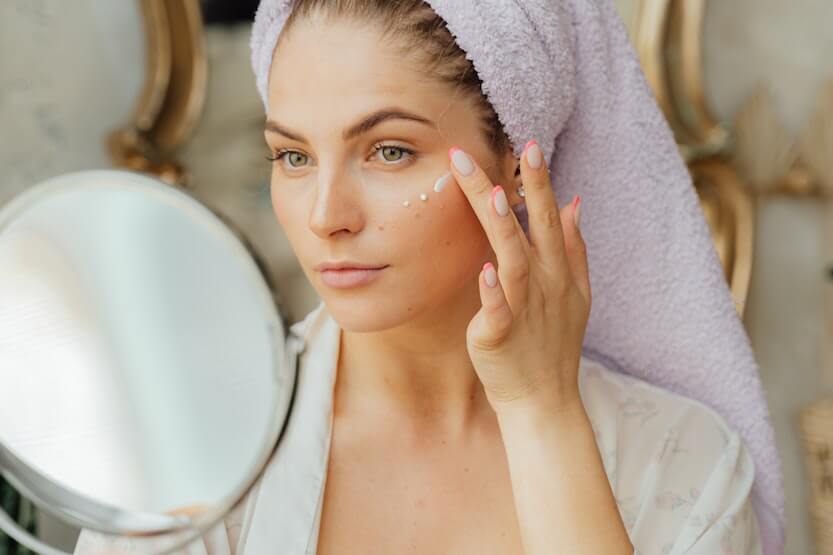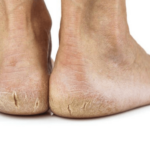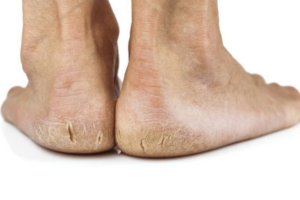Dry skin on the face can be frustrating and uncomfortable. It can make the skin feel tight, itchy, and even painful.
Dry skin can be caused by a variety of factors, including cold weather, harsh soaps, and certain medications. Fortunately, there are several steps that can be taken to treat dry skin on the face.
One of the most important steps in treating dry skin on the face is to use a gentle cleanser. Harsh soaps can strip the skin of its natural oils, making dry skin even worse.
Instead, opt for a gentle, non-foaming cleanser that is free of alcohol. It’s also important to avoid using hot water when washing the face, as this can further dry out the skin.
Common Causes of Dry Skin on Face

Dry skin on the face can be caused by a variety of factors. Some of the most common causes include:
- Environmental factors: Exposure to harsh weather conditions, such as cold temperatures, low humidity, and wind, can strip the skin of its natural oils, leading to dryness and flakiness.
- Hot showers: Taking long, hot showers can also contribute to dry skin on the face. Hot water can strip the skin of its natural oils, leaving it feeling tight, dry, and itchy.
- Medications: Certain medications, such as diuretics and acne treatments, can cause dry skin as a side effect. If you are experiencing dry skin as a result of medication, speak to your doctor about alternative treatment options.
- Smoke: Smoking cigarettes can also contribute to dry skin on the face. The chemicals in cigarettes can damage the skin’s natural barrier, leading to dryness, irritation, and premature aging.
To prevent dry skin on the face, it is important to take steps to protect the skin from these common triggers. This may include using a humidifier to add moisture to the air, avoiding hot showers and baths, and wearing protective clothing when outside in cold weather.
Additionally, choosing gentle, fragrance-free skincare products and avoiding harsh chemicals can help to soothe and hydrate dry skin on the face.
Role of Diet and Hydration

Dry skin on the face can be caused by a lack of moisture in the skin, which can be due to dehydration. Drinking enough water and other hydrating fluids can help keep the skin hydrated from the inside out. In addition to hydration, the foods that a person eats can also play a role in the health and moisture of their skin.
Eating a diet that is rich in fruits and vegetables can help provide the body with the vitamins and minerals it needs to maintain healthy skin. Some foods that are particularly beneficial for dry skin include sweet potatoes, red peppers, and kiwifruit. These foods are high in vitamin C, which can help boost collagen production and improve skin elasticity.
Omega-3 fatty acids, which are found in foods like salmon and walnuts, can also help improve skin health and prevent dryness. These fatty acids help to strengthen the skin’s natural barrier, which can help prevent moisture loss.
In addition to eating a healthy diet, it is also important to drink enough water to keep the skin hydrated. The amount of water a person needs will vary based on their age, weight, and activity level, but a general guideline is to drink at least 8 glasses of water per day. Other hydrating fluids, such as herbal tea or coconut water, can also be beneficial for keeping the skin hydrated.
Importance of Skin Care Routine
Taking care of the skin is essential to maintain its health and beauty. A good skin care routine can help prevent and treat dry skin on the face. It is important to establish a daily routine that includes cleansing, exfoliating, moisturizing, and protecting the skin from the sun.
A proper skin care routine can help remove dirt, oil, and dead skin cells that can clog pores and lead to breakouts. It can also help improve skin texture and reduce the appearance of fine lines and wrinkles. A good routine can also help prevent and treat dry skin by providing the necessary hydration and nutrients that the skin needs.
When it comes to cleansing, it is important to use a gentle cleanser that does not strip the skin of its natural oils. Harsh cleansers can actually make dry skin worse. Exfoliating can help remove dead skin cells and promote cell turnover, but it should be done gently and not too frequently.
Moisturizing is crucial for dry skin. Using a moisturizer that is appropriate for the skin type can help restore moisture and prevent further dryness. Creams and lotions are good options for daily use, while ointments can be used for more severe cases of dry skin.
Finally, protecting the skin from the sun is important for overall skin health. Sun damage can lead to dryness, wrinkles, and even skin cancer. Using a sunscreen with an SPF of at least 30 can help prevent sun damage and keep the skin looking healthy and youthful.
Choosing the Right Products for Dry Skin

When it comes to choosing the right products for dry skin on the face, there are a few things to keep in mind. First and foremost, it’s important to look for products that provide moisture to the skin. This can include oils, such as jojoba or argan oil, which can help to hydrate and nourish the skin.
However, it’s important to avoid products that contain fragrances, as these can be irritating to dry and sensitive skin. Look for fragrance-free options instead.
Another ingredient to avoid is alcohol, as it can be drying to the skin. Look for alcohol-free products instead.
One ingredient that can be beneficial for dry skin is ceramides. These are naturally occurring lipids that help to keep the skin hydrated and protected. Look for products that contain ceramides, as well as other fatty acids, which can help to strengthen the skin’s barrier.
Lanolin is another ingredient that can be helpful for dry skin. It is a natural oil that is derived from sheep’s wool, and can help to soothe and hydrate the skin.
When it comes to moisturizers, it’s important to choose a product that is right for your skin type. For those with extremely dry skin, a heavier moisturizer, such as petroleum jelly or mineral oil, may be necessary. For those with less severe dryness, a lighter moisturizer may be sufficient.
Natural Remedies for Dry Skin
Dry skin can be frustrating and uncomfortable, but there are several natural remedies that can help soothe and moisturize the skin. Here are a few options to consider:
Home Remedies
There are several home remedies that can help alleviate dry skin. One option is to take shorter showers or baths with lukewarm water instead of hot water, which can strip the skin of its natural oils. Another option is to use a humidifier in the home, which can add moisture to the air and prevent the skin from drying out.
Shea Butter
Shea butter is a natural ingredient that is often used in skincare products because of its moisturizing properties. It is rich in vitamins and fatty acids, which can help nourish and protect the skin. To use shea butter as a natural remedy for dry skin, apply a small amount to the affected area and massage it into the skin.
Coconut Oil
Coconut oil is another natural ingredient that can be used to treat dry skin. It has emollient properties, which means it can fill the spaces between skin cells and create a smooth surface. To use coconut oil as a natural remedy for dry skin, apply a small amount to the affected area and massage it into the skin.
Oatmeal
Oatmeal is a natural ingredient that can help soothe and moisturize dry skin. It contains compounds called avenanthramides, which have anti-inflammatory properties. To use oatmeal as a natural remedy for dry skin, mix a cup of colloidal oatmeal with warm water to create a paste. Apply the paste to the affected area and let it sit for 10-15 minutes before rinsing it off with warm water.
Impact of Lifestyle Choices on Dry Skin
Dry skin on the face can be caused by a variety of factors, including genetics, environmental factors, and lifestyle choices. The good news is that there are several lifestyle changes that can help alleviate dry skin and prevent it from recurring.
One of the most important lifestyle choices that can impact dry skin is the use of hot water. Hot water can strip the skin of its natural oils, leaving it dry and irritated. To prevent this, it is recommended to use lukewarm water when washing the face. Additionally, limiting the amount of time spent in the shower or bath can also help prevent dry skin.
Another lifestyle choice that can impact dry skin is the fabrics that come into contact with the face. Wool and other rough fabrics can irritate the skin, causing it to become dry and itchy. To prevent this, it is recommended to wear soft fabrics, such as cotton, and to avoid wearing wool or other rough fabrics directly against the skin.
Gloves can also impact dry skin on the face. Exposure to harsh chemicals and other irritants can cause the skin to become dry and irritated. Wearing gloves when cleaning or working with harsh chemicals can prevent this from happening.
Lastly, the use of certain products can also impact the skin’s moisture levels. Products that contain alcohol or other harsh ingredients can strip the skin of its natural oils, causing it to become dry and irritated. It is recommended to use gentle, fragrance-free products that are formulated for dry skin.
By making these simple lifestyle changes, individuals can help alleviate dry skin on the face and prevent it from recurring.
When to Consult a Healthcare Provider

In most cases, dry skin on the face can be treated with over-the-counter moisturizers and a few lifestyle changes. However, there are times when consulting a healthcare provider is necessary.
Diagnosis
If the dryness is severe, persistent, or accompanied by other symptoms such as redness, itching, or flaking, it may be a sign of an underlying medical condition. In such cases, it is best to consult a healthcare provider. They can perform a physical examination and ask questions about your medical history to determine the cause of your dry skin.
Infections
If the dryness is caused by an infection, such as eczema or psoriasis, a healthcare provider can prescribe appropriate treatment. They may recommend topical creams, ointments, or oral medications to help manage the symptoms and prevent further complications.
Dermatologists
In some cases, a healthcare provider may refer you to a dermatologist. Dermatologists are medical professionals who specialize in diagnosing and treating skin conditions. They can provide more specialized care for severe or chronic dry skin on the face.
Treatment
If over-the-counter moisturizers and lifestyle changes do not improve your dry skin, a healthcare provider can recommend other treatment options. They may suggest prescription-strength moisturizers, topical corticosteroids, or other medications to help manage your symptoms.
Potential Complications of Dry Skin
While dry skin on the face is generally a harmless condition, it can lead to a few complications if left untreated. Some of these potential complications include:
Itching and Itchy Skin
Dry skin can cause itching and itchy skin, which can be very uncomfortable and irritating. Scratching the affected area can further damage the skin and may lead to infection. If the itching is severe, it can also disrupt sleep and affect daily activities.
Pain and Inflammation
In some cases, dry skin on the face can become painful and inflamed. This is more likely to occur if the skin is cracked or bleeding. Pain and inflammation can make it difficult to carry out daily activities and can also affect a person’s mood and mental health.
Scaling
Dry skin can cause scaling, which is the shedding of dead skin cells. This can make the skin look rough and uneven. Scaling can also cause embarrassment and self-consciousness, which can affect a person’s social life and mental health.
Hands, Lips, and Scalp
Dry skin can also affect other parts of the body, such as the hands, lips, and scalp. Dry hands can become rough and cracked, making it difficult to carry out daily activities. Dry lips can become chapped and painful, making it difficult to eat and speak. Dry scalp can cause itching and flaking, which can be embarrassing and affect a person’s self-esteem.
To Summarize
To summarize, treating dry skin on the face involves maintaining a regular skincare routine that includes gentle cleansing, moisturizing, and protecting the skin from environmental factors that can exacerbate dryness.
It’s important to avoid harsh cleansers that strip the skin of its natural oils and to use lukewarm water when washing the face. Applying a moisturizer immediately after washing the face can help lock in moisture and prevent further dryness.
In addition to moisturizing, using a humidifier in dry indoor environments can help keep the skin hydrated. It’s also important to protect the skin from the sun’s harmful UV rays by wearing a broad-spectrum sunscreen with an SPF of at least 30.
If over-the-counter moisturizers and lifestyle changes are not effective, a dermatologist may recommend prescription creams or ointments to treat more severe cases of dry skin on the face.
Overall, taking a gentle and consistent approach to skincare can help alleviate dryness and promote healthy, hydrated skin on the face.


![Say Goodbye To Wrinkles On The Face [Easy Tips to Prevent Them] wrinkles on face](https://skincaregeeks.com/wp-content/uploads/2023/04/wrinkles-on-face-1-2-150x150.png)






